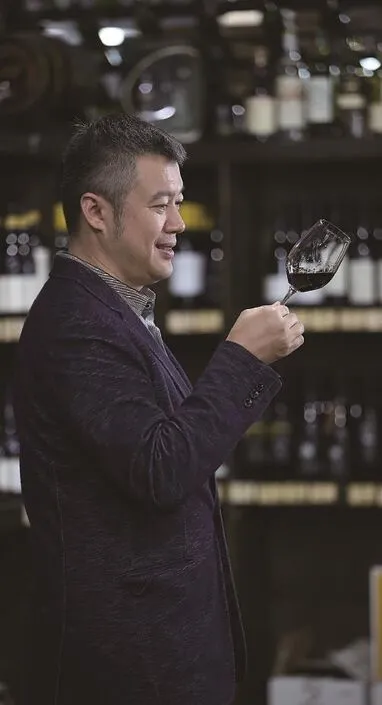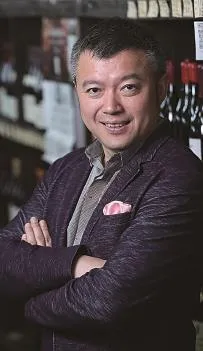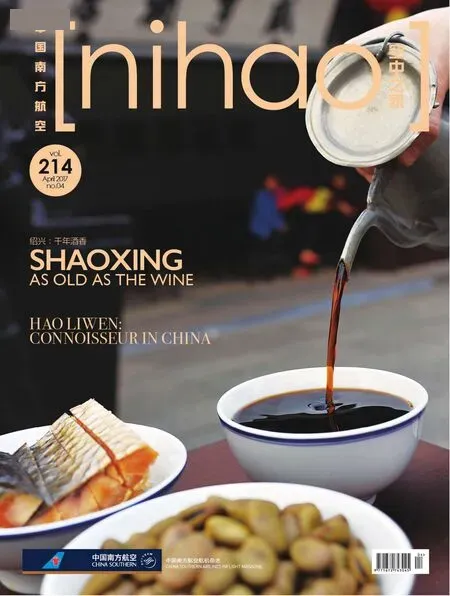HAO LIWEN: CONNOISSEUR IN CHINA
HAO LIWEN: CONNOISSEUR IN CHINA
Connoisseur is what people call Hao Liwen. But strictly speaking, this occupation is not offlcially recognised as a job in China. For now, Hao’s job is wine taster, commenter and trainer.
Text by Chen Yuqiang Photos by Chen He Translation by Zheng Ying
March 10th, a little cold in Shanghai. In a winery in Changning District, Hao Liwen took a bottle of wine out of the rack originally from Burgundy, France. Hao cut the seal with a wine knife, took out the cork and held the bottom of the bottle, moving it closer to the glass. The bottle inclined gently, and the liquid, which was clean as ruby, flew into the glass.
Hao Liwen lifted the glass up, swished it gently, sniffed the joyful smell before taking a sip.“Elegant” was Hao's comment.
Connoisseur is what people call Hao Liwen. But strictly speaking, this occupation is not offlcially recognised by the country, and there is no professional certiflcate for this job. For now, Hao's job is wine taster, commenter and trainer, but people will normally call him just connoisseur. “I think connoisseur is like an epicure, there is no high criteria for this. As long as somebody loves wine and is able to analyse it rationally, that's enough. If someone could know deeper and get more fun from this, then they will open the door of the world of the wine.”
As a rare connoisseur in China with WSET 4 grad diploma, Hao Liwen tastes and comments on nearly 1000~2000 wines every year, rating and reviewing them. There's a saying that connoisseurs swallow no wine when they taste. This is verifled by Hao.
“It's wasteful to just spit so much good wine. The wine sent to be tasted should have been treasured. It's their best fate to be tasted.” Said Hao. But when he tastes about more than 100 kinds of wine everyday, to keep the taste bud pure, most are spat out. Tasting too much wine could even hurt the nose. So in order to balance the smell, Hao will smell the back skin of the hand to recover his smell.
郝利文:品酒师在中国
品酒师,是外界对郝利文的称呼。在葡萄酒圈,郝利文更为人熟知的名字是“胡子马丁”,那是他为自己取的化名。严格来说,国内并没有品酒师这一职业,郝利文的身份目前是葡萄酒品评人、讲师,但是大众媒体依然习惯称郝利文为品酒师。

In this circle, Hao is famous for “Beard Martin”, that's an alias he made for himself. However, he didn't have a chaotic beard when we met him. When Hao was little, he loved the hotel manager with the beard in the TV series Grand Hotel, and he thought that was cool and wanted one for himself. But he was not allowed by his parents when he was little, and later not allowed by his wife. The beard he wants is never on his face, but becomes his alias.
Just like the story about his alias, Hao has a temperament mixed by western and eastern cultures. When he appears, he is always dressed up, regardless of whether he holds a glass in his hand or not. It's also a Shanghai style, appropriate and decent. During the process of more than 10 years' research for wine chateaus, he comes back and forth between two kinds of cultures and absorbs the best parts from both.
Since the flrst time he had stepped into the industry and tasted his flrst sip in 2004, he travelled in Chateaus in France, Italy, Spain, Portugal, Chile and other countries in South America, and pilgrimed in the Holy Lands in the world of wine, such as Bordeaux and Burgundy. So many years' travel and taste makes Hao realise how broad is this world of wine. “Every place has its own culture and its own style of wine. The wine is also restricted by the region even in the same area, yet there can be something different in details. For example, in Burgundy, there are more than 600 different regions. When you taste carefully, every region is so different. For now I only know the rough traits of Burgundy, and iflwant to master all the differences of every area, it would take more than my whole life.”
After travelling to the chateaus of the old and new world, Hao Liwen found out surprisingly that there are also good quality chateaus in China, where the culture of wine has been popular for only a short time. In Helan Mt in Ningxia and Tian Mt in Xinjiang, the wine from these exquisite chateaus have been gradually recognised and approved. In the coming years, Hao will be engaged in making more people realise that there are also competitive wine products in China.
3月10日,上海微冷。
在长宁区的一家酒坊,郝利文从酒架上挑出一支来自法国勃艮第红葡萄酒。用酒刀小心割开瓶封,取出软木塞,郝利文手握瓶底,将酒瓶平稳靠近酒杯。瓶身轻轻倾斜,带着红宝石般透彻的琼浆流入酒杯。
郝利文端起酒杯,轻轻摇晃,欣赏散落在酒杯里的芬芳,随后稍稍饮下一口。“优雅。”郝利文评价道。
品酒师,是外界对郝利文的称呼。但严格来说,并没有品酒师这一国家认可的职业,品酒师也没有任何专业的证书认证。郝利文的职业目前是葡萄酒品评人、讲师,但是大众媒体依然习惯称郝利文为品酒师。“我觉得品酒师像美食家一样没有很高的门槛,只要一个人爱品酒并且能分析得有道理,这就足够了。如果他能了解更多,他将能获得更多的乐趣,也打开了葡萄酒世界的大门。”
作为国内为数不多、拥有WSET4级Diploma资质的讲师,郝利文每年要品鉴近一、两千支酒,并为这些酒打分、写评论。有一种说法,说品酒师工作时几乎不将试饮的葡萄酒喝下去。这一说法得到郝利文的证实。
“要将这么多的好酒吐掉,真的很浪费。能送来品赏的葡萄酒,理应被饮用者珍惜,被他们饮用是葡萄酒最好的宿命。”郝利文说。最多一天需要品一百种酒,为了保证味蕾的纯净,大部分的酒都吐掉了。品太多种类的葡萄酒,甚至鼻子都会有影响。为了平衡嗅觉,郝利文会用闻手背皮肤的方法让嗅觉恢复。
在葡萄酒圈,郝利文更为人熟知的名字是“胡子马丁”,那是他为自己取的化名。然而,见面时郝利文脸上并没有留着乱糟糟的大胡子。成长时所喜欢连续剧《大饭店》的酒店经理留着大胡子,郝利文觉得很酷,一直很想留这样的胡子。谁知成长时父母不允许留胡子,成家后爱妻不允许留胡须,郝利文想拥有的胡子一直没在脸上长起来,反而成了他的化名。
正如这个名字的故事,郝利文的身上呈现出西方文化与东方文化交织的气质。当他出现时,永远衣着得体,无论手中有没有酒杯。这是上海的风格,得体、有分寸。而他在十几年考察葡萄酒庄的过程,也让他不断往返于两种文化,从两种文化之间汲取养分。
从2004年进入葡萄酒行业第一次喝到葡萄酒,十几年间郝利文游历过法国、意大利、西班牙、葡萄牙、智利、南美等国家的酒庄,到那些在葡萄酒世界里的圣地朝拜,波尔多、勃艮第等地区……多年的游历和品酒生涯,让郝利文意识到葡萄酒世界之大。“每个地方的文化都不一样,酒的风格也不一样。而且葡萄酒有地块的限定,就算在同一个地块上,都有细微的差异。比如勃艮第地区,可以分为六百多个地块,细细品尝,各个地块的葡萄酒都有所不同。如今我只能大致把握勃艮第地区的特点,如要把握各个地块的不同,也许穷尽一生的时间也不够。”
游历了旧世界、新世界的酒庄后,郝利文惊喜地发现,在葡萄酒盛行不久的国内,也开始有质量较好的酒庄。在宁夏的贺兰山、新疆的天山,这些精品酒庄出产的葡萄酒品质开始被认可。在接下来的时间,郝利文将致力于让更多人意识到,国内葡萄酒也有拿得出手的精品酒。

1999年
郝利文第一次旅居意大利,并深刻地接触葡萄酒。
2004年
正式进入葡萄酒行业。在这个阶段郝利文得到许多经典产区酒庄参观的机会,并在其后的十多年,访问和考察过全球近百家知名酒庄,足迹遍及美国、苏格兰、法国、 意大利、 德国、西班牙、 葡萄牙、智利、南非等国家。
2009年
作为葡萄酒主讲人拍摄了教育片《葡萄酒鉴赏家》。
2011年
获得WSET(英国葡萄酒和烈酒教育基金会)4级Diploma证书和认证讲师资格, 波尔多葡萄酒学校讲师资格。其后,郝利文先后获得勃艮第认证讲师、新西兰认证葡萄酒专家、法国香槟骑士、美国纳帕谷葡萄酒专家等证书。
体验式教学法,是指在教学过程中为了达到既定的教学目的,从教学需要出发,引入、创造或创设与教学内容相适应的具体情境或氛围,以引起学生的情感体验,帮助学生迅速而正确地理解教学内容,促进他们心理机能全面和谐发展的一种教学方法。体验式教学法使学生身临其境或如临其境,一则带给学生从形象的感知到抽象的理性的顿悟,二则激发学生的学习兴趣和学习情绪,使学习活动成为自主自发的活动。同时,在教学实践中,体验式教学法在英语阅读课、写作课研究相对较多,而将其运用到语法课研究的则比较少。[1]
2012年
作为主编加入《橄榄美酒评论》杂志,同年和齐仲婵一起出版《葡萄酒平常问》一书。
2014
加入《Decanter醇鉴》并担任中国品牌大使,出版《葡萄酒游记》一书。成为法国干邑认证讲师,并开始葡萄酒行业最高专业头衔——葡萄酒大师(Master of Wine)学习。
2015年
成为罗伯特·帕克团队的亚洲酒品评人,为《葡萄酒倡导家》(The Wine Advocate)及RobertParker.com品评来自亚洲的精品葡萄酒和清酒。借助这个世界上最有影响力之一的评分体系,给真正吸引人的亚洲酒带来更多来自葡萄酒世界的关注。
NOT EVERY WESTERNER KNOWS THEIR WINE, JUST LIKE MANY CHINESE ARE NOT EXPERTS IN TEA.
N=NIHAO
H=Hao Liwen
N: Is it easier for westerners than easterners to enter the world of wine?
H: People may misunderstand that in some foreign countries, especially in France and Italy, it seems that everyone knows about wine. In fact, it's not true. In research of wine, I have travelled to many countries, including those which are famous for wine production. I just found out that people there are not necessarily more knowledgable about wine than we are. For instance, some foreigners also think that every Chinese is good at Tea ceremony. But actually, most of us just drink normal tea everyday, and have no expertise in the ceremony. To my opinion, their advantage lies in the language. If people can overcome the difflculty of language, they are more likely to learn something profound in this fleld.
N: When red wine first came onto our table, it was popular to drink it with Sprite. Is this a mistake?
H: To add Sprite into red wine feels a little“unenlightened”, but not really wrong. Some Chinese drink red wine with Sprite just because they don't get used to this kind of bitter taste. It's the same when foreigners love to take tea with milk and warm water. Spanish also make Sangria with Sprite. However, when taking some good wine, I suggest not adding anything else, just straight.
N: Why would you use the word “elegant“ to review the wine that you approve?
H: My friends are always, just laughing at me about my only one comment on wine, “elegant”. Of course, I have plentiful words when I want to express something. “Elegant” is a basic criterion to judge a good wine. Just like people, wine has its personality, so using words like “elegant”,“humble”, “flne”, and “smooth” can also be objective, and this kind of skill has been working since old times. This way of review is not to mystify something, but rather to make the readers know deeper about wine. For example, a type of wine is reviewed as “strong strike in velvet”. At the flrst sight, it looks confusing. But when you think about it twice, you can feel this comment can describe the gentle feeling at the flrst sip, but it has a stronger power when you swallow it, like a strong strike to your mouth. These ways of commenting on wine are also very interesting when you compare your thinking with the real tastes.
N: when you taste red wine, do you need rituals to help you get into a groove?
H: Rituals are needed absolutely. We don't need a full set of rituals like having a bath, changing the clothes, burning incense and playing music. But drinking red wine also needs some speciflc routine tools and atmosphere to help me immersed into the world of wine, such as clean glasses, an environment without smell, light without colours……These can groove me up quickly. I like it most when in a leisurely afternoon, I take out a good wine and taste it in peace. It's an ideal status.
“不是每个西方人都懂葡萄酒,正如不是所有中国人都精通茶”
N:进入葡萄酒世界时,西方人会比东方人更容易吗?
H:大家可能会有这样一个误解,觉得国外,尤其是在葡萄酒名气较大的法国和意大利,似乎人人都懂红酒,其实并不是。在考察红酒的过程中,我游历过许多国家,包括那些盛产葡萄酒的国家,我发现他们所懂的葡萄酒知识,不一定比我们多。打个比方,外国人都以为中国人个个都精通茶道,但实际上我们大部分人只是日常中习惯饮茶,并无深入认识。在这一点上,国内与国外学习葡萄酒知识处于同一起跑线,不存在他们因为身处那个国度所知的葡萄酒知识就一定比我们多。我个人认为,他们学习葡萄酒知识的优势在于语言。很多葡萄酒术语,是用当地语言表达的,用英语或者其他语言翻译过来未必准确。如果大家能够克服语言困难,在学习葡萄酒知识的道路上一定能走得更深远。

(本图由伊周Femina杂志提供)
N:红葡萄酒刚开始出现在国内酒桌时,比较流行加入雪碧饮用。这是不是一个误区?
H:在红葡萄酒中加入雪碧,让人感觉有点“土”,不能完全说是错误的。中国人喝红葡萄酒加入雪碧,是因为对丹宁的苦涩口感还不习惯。这和外国人喝中国茶加温水和奶,道理是一样的。西班牙人在饮用葡萄酒的时候也会加入雪碧,做成桑格利亚。但是,在品尝好的红葡萄酒时,我强烈建议不要加入其他东西,直接饮用是最好的享受。
N:为什么喜欢用“优雅”这一词来评价你认可的葡萄酒?
H:我的朋友老是笑我,说我在试饮葡萄酒时只有“优雅”一个评价。当然,我在用文字表达的时候词汇会丰富很多。“优雅”,是我认为好的葡萄酒必须要达到的一个基本要求。像人一样,葡萄酒也有个性,所以用“优雅”“不张扬”“细腻”这些形容人的词汇去形容葡萄酒也是客观的,这种手法自古有之。这种手法不是故弄玄虚,而是力图帮助读者更深入地了解葡萄酒,比如有一款葡萄酒被评为“戴丝绒的铁拳”。乍一看,不懂是什么意思。如果细细去想,这个评价是描述该葡萄酒初入口时很温柔,但是喝下去后受到的冲击很大,口腔仿佛被铁击集中一般。这些葡萄酒的评价方式,慢慢体会后与饮用感相对照,也会是一种乐趣。
N:你在品尝葡萄酒时,会需要仪式感帮助你进入状态吗?
H:仪式感还是需要的。当然我们现在做不到沐浴更衣焚香奏乐这样一套仪式,但是饮用葡萄酒,我觉得还是要有固定的工具、环境帮助我沉浸入葡萄酒的世界。比如说干净的杯子、没有味道的环境、没有颜色的灯,这些都能帮我进入品尝的状态。我最喜欢的是在一个空闲的下午,打开一支好葡萄酒,安安静静地品味。这是一个美好的下午。

